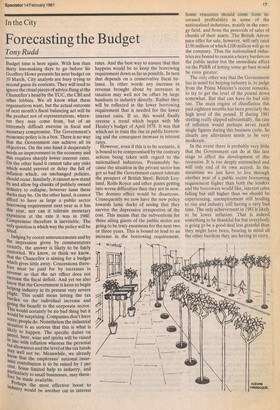Forecasting the Budget
Tony Rudd
Budget time is here again. With less than thirty loss-making days to go before Sir Geoffrey Howe presents his next budget on 10 March, City analysts are busy trying to second guess its contents. They will tend to ignore the ritual pieces of advice flung at the Chancellor's head by the TUC, the CBI and other lobbies. We all know what these organisations want, but the actual outcome of next month's fiscal balancing act will be the product not of representations, wherever they may come from, but of an extremely difficult exercise in fiscal and monetary compromise. The Government's economic policy is in a box. There is no way that the Government can achieve all its Objectives. On the one hand it desperately needs an improvement in the economy and this requires sharply lower interest rates. On the other hand it cannot take any risks Which would prevent or delay the fall of inflation which, on unchanged policies, Should occur. Similarly, it cannot now stand bY and allow big chunks of publicly owned industry to collapse, however lame these ducks may be. On the other hand, it cannot afford to have as large a public sector borrowing requirement next year as it has this year, nor can it tolerate monetary expansion at the rate it was in 1980. Compromise therefore is inevitable. The Only question is which way the policy will be tilted.
Judging by recent announcements and by the impression given by commentators recently, the answer is likely to be fairly contorted. We know, or think we know, that the Chancellor is aiming for a budget which gives little away. Concessions therefore must be paid for by increases in revenue so that the net effect does not increase the fiscal deficit. And yet we also Lirnow that the Government is keen to begin tiFiPing industry in its present very severe glight. This could mean letting the tax ,,turden on the individual increase and Living the benefit to the corporate sector. rlis would certainly be no bad thing but it would be surprising. Companies don't have v9tes; People do. Nonetheless the industrial !yruation is so serious that this is what is likely to happen. The specific duties on Ferrol, beer, wine and spirits will be raised ) line with inflation whereas the personal tax With and the level of the tax bands t'la), well not be. Meanwhile, we already ,rlow that the employees' national insur „"_nee contribution is to be raised by 1 per cent Some limited help to industry, and part: to small businesses, may there the most effective boost to usirY would be another cut in interest rates. And the best way to ensure that that happens would be to keep the borrowing requirement down as far as possible. In turn that depends on a conservative fiscal balance. in other words any increase in revenue brought about by increases in taxation may well not be offset by large handouts to industry directly. Rather they will be reflected in the lower borrowing requirement that is needed for the lower interest rates. If so, this would finally reverse a trend which began with Mr Healey's budget of April 1978. It was that which set in train the rise in public borrowing and the consequent increase in interest rates.
However, even if this is to be scenario, it is bound to be compromised by the contrary actions being taken with regard to the nationalised industries. Presumably because the situation in the private sector has got so bad the Government cannot tolerate the prospect of British Steel, British Leyland, Rolls-Royce and other giants getting into worse difficulties than they are in now. The domino effect would be disastrous. Consequently we now have the new policy towards lame ducks of seeing that they survive the depression irrespective of the cost. This means that the subventions for these ailing giants of the public sector are going to be truly enormous for the next two or three years. This is bound to lead to an increase in the borrowing requirement. Some resources should come from increased profitability in some of the nationalised industries, mainly in the energy field, and from the proceeds of sales of chunks of their assets. The British Aerospace offer for sale, however, will only raise £150 million of which £100 million will go to the company. Thus the nationalised industries are bound to remain a heavy burden on the public sector but the immediate effect on the PSBR of letting some go bust would be even greater.
The only other way that the Government has in mind for helping industry is, to judge from the Prime Minister's recent remarks, to try to get the level of the pound down somewhat. But that can have its bad side too. The main engine of disinflation this past eighteen months has been precisely the high level of the pound. If during 1981 sterling really slipped substantially, the rate of inflation would perhaps never reach single figures during this business cycle. So clearly any alleviation needs to be very moderate.
In the event there is probably very little that the Government can do at this late stage to affect the development of this recession. It is too deeply entrenched and will only end of its own accord. In the meantime we just have to live through another year of a public sector borrowing requirement higher than both the lenders and the borrowers would like, interest rates falling but still higher than we should be experiencing, unemployment still tending to rise and industry still having a very bad time. The only achievement in 1981 is likely to be lower inflation. That is indeed something to be thankful for but everybody is going lo be a good deal less grateful than they might have been, bearing in mind all the other burdens they are having to carry.






































 Previous page
Previous page